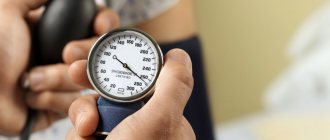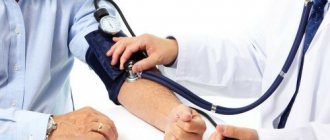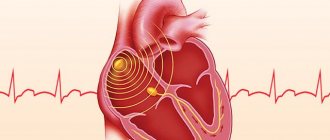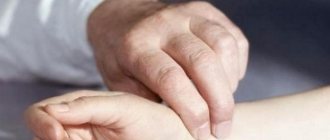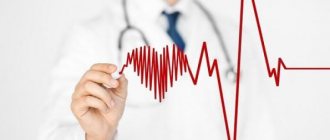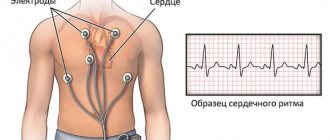Slow (weak) pulse is a condition in which the heart rate decreases to 60 beats per minute or below. The norm is considered to be 60-90 beats per minute. A pulse rate of less than 60 beats per minute is called bradycardia.
If the heart rate (HR) drops to 50 beats/min, this may indicate the presence of a disease. A constant, rare heartbeat at 40 beats/min for several days requires medical examination. A decrease in heart rate within 40-35 beats per minute poses a threat; the brain begins to feel a lack of oxygen; a decrease in heart rate to 30 beats per minute requires immediate medical attention.
Causes of a weak, slow pulse
Almost all reasons for a decrease in normal heart rate are associated with pathologies. Let's highlight the main ones:
- Cardiovascular – the cause of low pulse in a weak heart and associated diseases:
- syndrome of weak sinus node - the heart's own pacemaker, conduction disturbances (heart block), more often observed in the elderly;
- coronary heart disease, angina pectoris, heart failure;
myocardial infarction;
- cardiomyopathy;
- myocarditis;
- heart defects.
- Toxicology – poisoning by toxins of various origins:
- overdose of drugs (beta blockers, calcium antagonists);
acute food poisoning;
- diets – metabolic disorders;
- bad habits.
- Organic diseases – pathologies associated with the heart:
- diseases of the endocrine system (thyroid gland, diabetes mellitus, dysfunction of the adrenal glands);
increased sensitivity to stuffiness, heat;
- intracranial pressure;
- infectious diseases.
- Physiological bradycardia:
- night sleep - during sleep, all processes in the body slow down, including heart function and blood circulation.
professional sports - the pathology is called “athlete's heart syndrome”. In this case, the heart rate can drop below 50 beats per minute, without any negative consequences for the athlete. During exercise, your heart rate can increase quickly.
What should an adult’s pulse be like: normal and pathological
What is the pulse like? What do its values depend on? Is the pulse always equal to the heart rate?
Physician, cardiologist at Clinic Expert Voronezh, Angelina Anatolyevna Kalinina, helped us find answers to these and other questions.
— Angelina Anatolyevna, what is a pulse and what does its frequency depend on?
The pulse is a rhythmic oscillation of the walls of the arteries, associated with the entry of a certain amount of blood into them during the contraction of the heart and a change in pressure.
Heart rate is affected by:
— level of physical activity (rest, exercise);
— condition of the heart muscle and valves;
- blood pressure value;
— work of the neuroendocrine system;
- level of basal metabolism (one of the criteria is body temperature).
BECAUSE THE PULSE MAY BE IRRHYTHMIC, IT IS RECOMMENDED IN ALL CASES TO COUNT IT FOR NO LESS THAN 60 SECONDS
A situational increase in heart rate is possible when taking certain substances (both medicinal and toxic), and this also happens in a person in a positive and negative emotional state (joy, fear, anger, etc.).
— How to measure the pulse correctly?
Mainly by palpation (feeling) of the vessel. The pulse can be counted in the radial, carotid, temporal, and femoral arteries. But in practice, the radial artery is most often used.
The wrist of one hand or another is covered with the fingers in the area of the wrist joint, the artery is felt, pressed with 2-3 fingers, and the pulse is counted.
Read the material on the topic: What should a child’s blood pressure be?
Usually the pulse is counted for 1 minute. In the literature you can find measurement methods where the pulse is calculated for 15 seconds and then multiplied by 4, or for 30 seconds and then multiplied by 2. However, due to the fact that the pulse can be irregular, it is recommended in all cases to count it at least than within 60 seconds.
— In Chinese medicine, there is a diagnostic method based on the pulse. In fact, what can the pulse tell you?
Indirectly, the pulse can be used to judge the heart rhythm (and its disturbance), the state of the myocardium, heart valves, blood vessels and vascular wall, the level of basal metabolism, the functioning of the autonomic nervous system, and the emotional state of a person.
Read material on the topic: Heart, why don’t you want peace? What causes tachycardia?
— What should be the normal heart rate of an adult?
According to various sources, normal levels in adults range from 60-80, 60-90 beats per minute. The number of pulse beats is equal to the heart rate (HR), i.e. Normally, there should be no so-called pulse deficit (a situation when its frequency is less than heart rate. This occurs, for example, with atrial fibrillation). In addition, the normal pulse is rhythmic, symmetrical, with satisfactory filling and tension.
— What affects a person’s pulse? What factors does it depend on?
There are several factors. The symmetry of the pulse is affected by a decrease in the lumen of one of the arteries, its incorrect location (the radial one itself, or the overlying ones, the radial branch of which is), compression of the artery (for example, an aortic aneurysm, a neoplasm, enlarged lymph nodes).
NORMALLY IN ADULTS, THE PULSE VALUES WITHIN 60-80, 60-90 BLOCKS PER MINUTE
Pulse is also influenced by heart rate; the adequacy of the contractility of the heart and the amount of blood ejected into the aorta during contraction of the left ventricle; condition of the artery wall; operation of the valve apparatus.
- For what reasons can the pulse decrease?
If this means a decrease in heart rate, then normally this is possible during intense sports training, in a state of sleep.
A rarer, slower pulse, as an indicator of pathology, may occur with certain disorders of the rhythm and conductivity of the heart, aortic valve stenosis, a disorder of the autonomic nervous system, poisoning, and certain infectious diseases (typhoid fever, brucellosis).
Read the material on the topic: Is there a diagnosis of vegetative-vascular dystonia?
Taking certain medications (beta blockers, antiarrhythmic drugs) can reduce your heart rate.
- If the pulse is low, does this mean that the person has low blood pressure?
If by low heart rate we mean rare, then such a relationship does not always happen. There are situations when the pulse is low and the blood pressure is high.
Read the material on the topic: For what reasons can blood pressure be low?
— Under what conditions can the pulse be high?
If a high pulse is understood as its increase, then the cause may be physical activity, stress, consumption of caffeine-containing drinks, or a number of medications (for example, aminophylline, nifedipine, cordiamine, salbutamol, atropine).
A frequent pulse can occur in various pathologies: diseases of the cardiovascular system (rhythm and conduction disorders; damage to the myocardium and pericardium, valvular apparatus; heart failure), dysfunction of the autonomic nervous system with a predominance of the influence of its sympathetic department, most infectious diseases, diseases of the endocrine system ( thyrotoxicosis), bleeding from the gastrointestinal tract, pulmonary edema, pulmonary embolism, shock and a number of others.
— Angelina Anatolyevna, is a high pulse always accompanied by an increase in blood pressure or is this not necessary?
No, this doesn't always happen.
Read related material: The Ultimate Guide to High Blood Pressure: Frequently Asked Questions
— What heart rate indicators require urgent medical attention?
Pulse parameters in themselves are not always a reason to urgently consult a doctor. However, if a decrease or increase in heart rate is accompanied by any symptoms (for example, with a low pulse, dizziness and loss of consciousness are noted), then you should immediately consult a doctor.
— How to provide first aid at home to a person who has a high or low pulse?
It is necessary to clarify whether such conditions have occurred before, what they were associated with, how they were tolerated; What diseases does he suffer from and have suffered in the past?
You should definitely ask about the person's medications: it is possible that he forgot to take a medicine (for example, a beta blocker), which is why his pulse quickened. Taking the drug in this case can be first aid.
AN IMMEDIATE CALL OF AN AMBULANCE IS NECESSARY IF THE CONDITION OF HIGH OR RARE PULSE HAS DEVELOPED FOR THE FIRST TIME, ESPECIALLY IF THE PERSON HAS PREVIOUSLY HAD SOME DISEASES
If you have a tonometer and thermometer, measure your blood pressure and body temperature. Reducing high numbers for both indicators can also have a positive effect on your heart rate.
In case of stress or autonomic dysfunction, it is necessary to try to calm the patient. Taking one of the drugs such as valocordin, corvalol, valerian, motherwort may help.
If the pulse is low, it is better if the person lies down. Of course, you need to lie down even if your pulse is high, if this condition is accompanied by general weakness, a feeling of lightheadedness, or dizziness.
If a low pulse is accompanied by low blood pressure, you can drink tea or coffee.
If there are no positive changes, you must call an ambulance. In addition, an immediate call is also needed in the case of an increase or decrease in heart rate that develops for the first time (and especially suddenly); progressive deterioration of health, especially in a person who has had certain diseases previously (for example, heart rhythm disturbances, myocardial infarction or stroke, gastrointestinal bleeding, pulmonary edema, pulmonary embolism).
Subscribe to our materials on social networks: VKontakte, Odnoklassniki, Facebook
For reference:
Kalinina Angelina Anatolevna
In 2007 she graduated from the Voronezh State Medical Academy named after. Burdenko.
From 2007 to 2008 she completed an internship in therapy, in 2010 she underwent professional retraining in the specialty “General Medical Practice (Family Medicine)”, and in 2017 – in the specialty “Cardiology”.
Since 2015, he has been working as a general practitioner, and since 2021, as a cardiologist at Clinic Expert Voronezh. Reception is conducted at the address: st. Pushkinskaya, 11.
Symptoms of a weak (slow) pulse
A 10% decrease in heart rate does not affect your well-being in any way. When the pulse reaches 40 beats/min, symptoms appear:
- weakness;
- dyspnea;
- darkening of the eyes;
- fainting state;
- fainting or loss of consciousness.
In the early stages, a decrease in heart rate may seem like a normal ailment or may be asymptomatic. Therefore, at the first symptoms, measure your blood pressure and pulse. If you notice a deviation from the norm, consult a doctor. At the cardiology center of the Federal Scientific and Clinical Center of the Federal Medical and Biological Agency, you will be offered several heart research programs and will conduct the necessary examinations to determine the cause of a weak pulse.
Indicators after waking up
The morning hours are the calmest, the time when people wake up in a peaceful state. But the pulse, both in adults and in children, is observed to be rapid. This is a completely normal situation due to a sudden awakening. After 5-10 minutes, the pulse beats normalize and stabilize.
After waking up, the body's functions switch to daytime mode and begin their activity. If the pulse quickens, this may be the result of restless dreams, which are most often caused by stress, anxiety, emotional arousal, or indicate cardiac problems responsible for blood circulation.
Cardiologists do not recommend a sharp rise to a vertical position; this puts a lot of stress on the heart muscle. Natural recovery consists of a gradual awakening; after waking up completely, you need to lie down for a few minutes to restore cardiac functions.
There are situations when, after waking up, weak pulse beats are observed. In order to raise them to a normal level, they do morning exercises and yoga. A pulse of 40 beats per minute is a reason to consult a doctor.
Athletes and those who are actively involved in physical education have larger hearts than those who are indifferent to training. This is due to the fact that the heart is a muscular organ. With moderate loads, it increases in size, as a result, it safely pumps blood, which normalizes blood pressure. The most important thing is that it strengthens the entire cardiovascular system.
Diagnostics
Before making a diagnosis, it is necessary to undergo a series of studies that will confirm or refute the disease. Consultation with a cardiologist is necessary. The doctor begins by interviewing and examining the patient. After collecting anamnesis, the patient is sent for instrumental examination. Additionally, studies are prescribed:
- ECG;
- ECHO CG;
- MRI;
- chest x-ray;
- 24-hour Holter monitoring;
- load tests;
- consultation with a neurologist.
Timely diagnosis allows you to identify the disease, stop it and begin the necessary treatment.
What needs to be examined
The functioning of the cardiovascular, excretory, nervous, and endocrine systems is subject to assessment. Relevant specialists. The main one is a cardiologist, the rest are connected as needed.
Among the techniques:
- Collection of medical history and complaints of the patient about his own condition. Objectification of symptoms plays a key role in diagnosis and determining its directions.
- Measurement of blood pressure, heart rate. Using an automatic device.
- Listening to heart sounds.
- Electrocardiography. Profile research. They resort to him first of all. Allows you to identify subtle changes in the functional activity of a muscle organ. Deciphering requires a highly qualified cardiologist.
- Echocardiography. Ultrasound examination of the condition of the heart muscle.
- Assessment of neurological and nephrological status.
- Blood and urine tests.
Specialists whose consultation may be required, in addition to the cardiologist: endocrinologist (hormonal levels), neurologist (CNS), nephrologist (excretory system, kidneys). In other situations, a neurosurgeon (identified brain tumors), an oncologist.
Prevention
Prevention of a weak pulse involves eliminating the underlying disease that caused the bradycardia. It is necessary to undergo an annual examination and consult a doctor. Follow all his recommendations and assignments. Follow the dosage and regimen of taking medications. Lead a conscious lifestyle:
- eat right and watch your weight;
- engage in physical therapy;
- to refuse from bad habits.
For prevention purposes, never resort to traditional medicine without first consulting your doctor. Against the background of a weak pulse, high blood pressure may occur. And most recipes involve foods that can increase blood pressure. This will only harm your health and cause additional complications.
The most reliable method of prevention is regular examination. There are several programs at our center. You can get acquainted with them by following the link.
What to do if your heart rate is low
To cure a decreased heart rate, you need to know exactly its cause. If the condition is caused by hormonal pathology or water-electrolyte imbalance, therapy is selected after conducting the necessary tests for hormones and electrolytes. Taking medications replenishes the lack of necessary substances and thereby normalizes heart rhythm.
If bradycardia is due to drug overdose, other drugs should be selected or daily doses reduced.
A low pulse during intoxication is a side effect caused by the underlying disease, so it is this that needs to be treated.
If the decrease in heart rate is due to cardiac pathology, the cardiologist selects the appropriate treatment for the given clinical case. Even in the absence of symptoms, people with bradycardia need to undergo regular medical examinations to monitor changes in heart function.
For a chronic decrease in heart rate, the following is prescribed:
- cardioprotectors;
- drugs to improve metabolic processes in myocardial tissues;
- antioxidants;
- drugs with anabolic effects.
Duration of treatment is 3-6 months. The doctor selects a combination of medications and monitors the progress of treatment. Complex therapy may include herbal preparations that have a tonic effect. Basically, extracts of ginseng and eleutherococcus are prescribed - natural stimulants.
In severe conditions, it is important to normalize the pulse rate as soon as possible to avoid tissue hypoxia. The patient is hospitalized and parenteral drugs are used to improve myocardial function.
How to treat
Before starting treatment, it is necessary to undergo a medical examination. Only after identifying the underlying cause can the attending physician prescribe therapy. The main methods include:
- drug therapy – taking medications. In our center, the Federal Scientific and Clinical Center for Medical and Biological Agency, patients are offered outpatient or inpatient treatment. If the patient is old, it is better to assign him to the therapeutic department, where he will be under the constant supervision of doctors and nurses. personnel;
- therapeutic and preventive procedures - moderate physical activity, adherence to a daily routine, taking herbal medicines as prescribed by a doctor for the purpose of prevention;
- surgical intervention - radical measures are resorted to when a concomitant disease affects the decrease in pulse rate. These include implantation of a pacemaker, elimination of certain rhythm disturbances that can lead to bradycardia. Only after all the necessary examinations and tests can the doctor recommend surgery. The cardiology center of the Federal Scientific and Clinical Center of the Federal Medical and Biological Agency has a surgical department. Doctors with many years of experience perform complex open-heart surgeries.
Why might your heart rate drop?
Unfortunately, this entire system can break down at different stages and lead either to a decrease and/or cessation of the flow of “current” (blockade) or to incorrect conduction of the impulse in various parts of the heart:
- The first “breakage” may be at the level of the sinus node itself. For various reasons, organic or functional, it loses the ability to produce the required number of impulses. For example, no matter how much a person runs or climbs the stairs, the sinus node cannot rise above a hundred beats, which may result in increased shortness of breath or weakness.
- The second “breakage” may be at the level of the atrioventricular (AV) node. Let me remind you that it is located between the atria and ventricles, an impulse passes through it from the atria to the ventricles; it is needed in order to create a short physiological pause for a more complete contraction of the atria. At this level, all kinds of blockades (AV blocks) can occur. They come in different degrees, 1st, 2nd or 3rd degree depending on the severity of the condition. From the name it is clear that they block the impulse at this stage, as a result the ventricles of the heart cannot contract, this leads to pauses, sometimes significant ones (3 or more seconds); for example, depending on the body’s reserves and concomitant pathology, starting from a 3-second delay in heart contraction, a person may begin to briefly lose consciousness; as these blockades progress, consciousness, sometimes, may not return. Let us reassure you a little: nature has come up with life-saving “(emergency) stations” for generating backup impulses; they are located at all stages of the conduction system, but the “lower” they are located, the less “current” they are able to reproduce. So, in case of this breakdown, the “backup generator” is already in the ventricles and is capable of delivering a maximum of 40 beats or less, so that this can allow one to “hold out” to the resuscitation ambulance team.
- The third “breakdown” can occur below the atrioventricular (AV) node at the level of the bundle branches (these are “wires” that extend from the atrioventricular node and excite the ventricles; we will talk about them in more detail in another article).
Unfortunately, these legs can also be partially or completely blocked due to various reasons, thereby preventing the full contraction of the ventricles of the heart.

